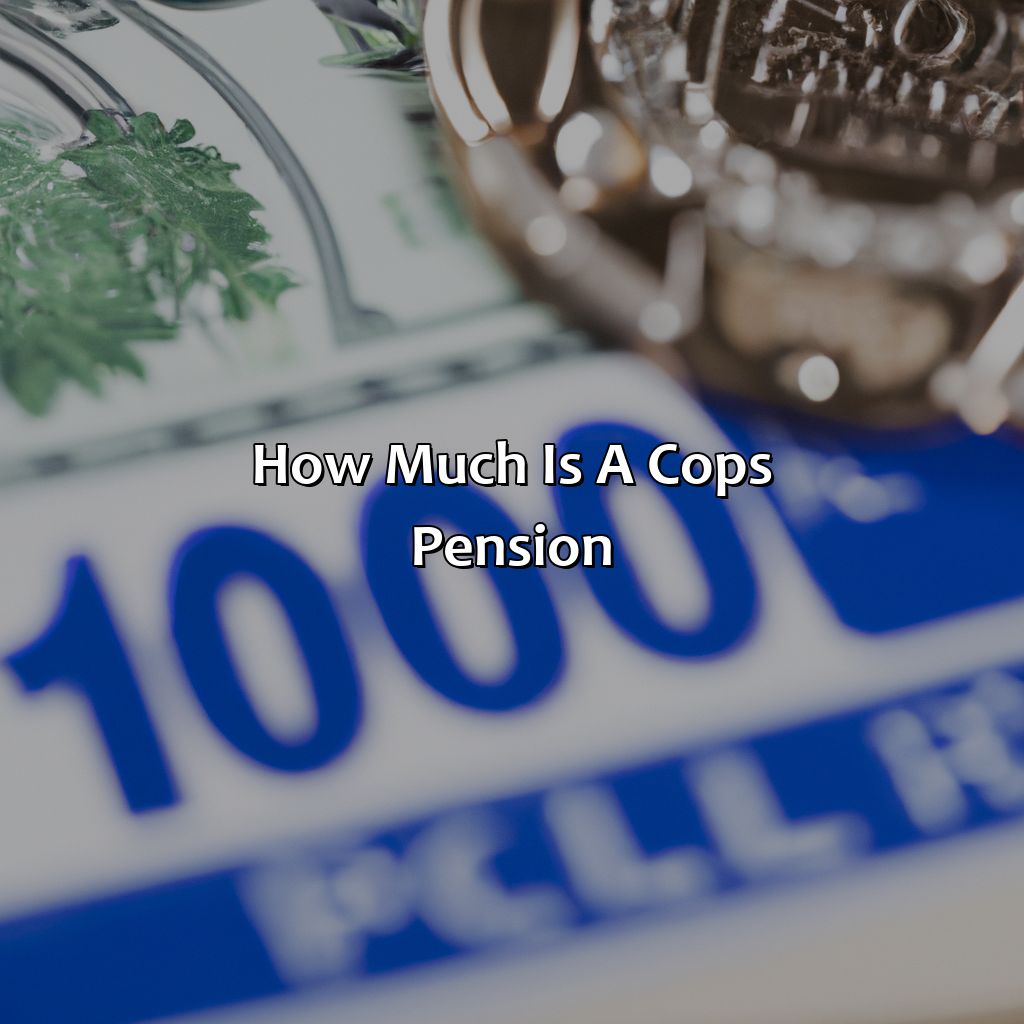How Much Is A Cops Pension?
Key Takeaway:
- A police officer’s pension amount is determined based on their years of service and average final compensation, according to a benefit calculation formula.
- There are three main types of police pension plans: defined benefit plan, defined contribution plan, and hybrid plan.
- The national average police pension amount varies depending on factors such as location, employer, and length of service. Factors such as overtime pay and pension reforms can also affect pension amounts.
You’ve likely heard about the generous pension that police officers get- but have you ever wondered how much they actually receive? In this blog, we will explore the details of police officer pensions and how they can shape an officer’s retirement.
Determining a Police Officer’s Pension
Want to know a police officer’s pension on retirement? Let’s understand the relevant calculations. It’s based on the number of years of service, and final average compensation. The benefit calculation formula gives us an idea of how pensions are determined. In this section we’ll briefly go through:
- Years of Service Calculation
- Average Final Compensation Calculation
- The Benefit Calculation Formula
These explain the pension calculations for police officers.

Image credits: retiregenz.com by David Jones
Years of Service Calculation
When determining a police officer’s pension, assessing the years of service is crucial. The duration an officer spends serving their community determines their retirement benefits. Here is a guide on determining years of service calculation for police officers:
- Start by counting the number of years the officer worked after completing their initial training in a police academy.
- Include any leave taken during those years, such as sick days, holidays, and vacation time.
- Add time spent carrying out other services that qualify towards pensions like military or educational service time.
- Determine if any other provisions apply to this particular pension arrangement and consider any potential changes to local laws and policies with regards to pension regulations.
- If necessary, seek advice from experts such as financial advisors or lawyers who specialize in public pension systems.
It’s important to note that some pensions called “defined benefit plans” use formulas based on an officer’s age, length of service, and contributions to determine the guaranteed monthly retirement payment.
While each city/state’s pension plan differs slightly regarding calculations, understanding the intricacies of a cop’s pension will ensure adequate preparation for their retirement. Anyone considering joining the force should always be mindful of knowing what percentage of workers have a pension and how different scenarios can impact their future finances.
We suggest that, before taking action on your pension plan, you scrutinize all benefits offered under the plan carefully. Whenever possible, choose deferred compensation plans like 457(b) which allow cops making additional contributions from their paychecks. Additionally, take full advantage of wealth-building opportunities provided by employee assistance programs like financial planning services groups whenever they become available.
Why bother with a calculator when a cop’s final compensation is simply the sum of donuts consumed on duty?
Average Final Compensation Calculation
Determining the final compensation of a police officer is a crucial factor in calculating their pension. This involves determining an officer’s average total pay, including base salary, overtime pay, and benefits during the years leading up to retirement. By dividing this average by a predetermined number of years, typically three or five, the final compensation can be estimated accurately.
It is imperative to ensure that the calculation of final compensation is consistent with your state’s laws and regulations governing police pensions. Some states include additional factors such as longevity pay and generous leave time in their calculation formulas. If you are wondering about how much a government pension is for cops, it’s best to check with your state’s specific regulations.
The officer’s role and responsibilities throughout their career also affect their pension amount. These include serving in specialized units such as homicide investigations or hazardous duty roles like SWAT teams.
A notable example is when irregularities were discovered in Boston s Police Pension Fund payment system from 1986 to1998. The discrepancies led to over 100 former officers being awarded increased pensions following litigation pursued by injured officers. The lawsuit served as precedent for similar lawsuits across other U.S states.
It’s important to know how much is the retirement pension in USA to plan your financial future accordingly.
Calculating a cop’s pension benefits is like solving a Rubik’s cube, except it takes longer and doesn’t come with instructions.
Benefit Calculation Formula
Calculating a Police Officer’s Retirement Benefits can be intricate. The Pension Benefit Calculation Process involves intricate calculations based on service and salary. Each pension system has its own formulae for determining an officer’s benefits. It is crucial to think about this before joining the police.
The benefit calculation process depends on the amount of time worked, the final salary, total years of service, and a variety of other factors that vary from state to state and pension plan to pension plan. By understanding all of these variables, police officers may be able to ensure they are obtaining the maximum possible retirement benefits. If you are specifically curious about how much the pension is in Denmark, there are resources available to help you research and understand the specific benefits available in that country.
Understanding how much money a retiring police officer will receive in retirement should not be overlooked when evaluating employment prospects. Because different pension schemes offer varying formulas for calculating retirement pay, it is essential for aspiring cops to comprehend which option is best suited for their long-term goals.
What is Basic Pension Rate? is an important question that needs to be answered before making any financial decisions.
Stay ahead by being aware of retirement laws, rules and regulations pertaining to your occupation. Avoid missing out on potential earnings or taking an ill-informed decision about joining the force without knowing what you’re ultimately going to get!
Pensions for cops come in different plans, just like their tactics for catching criminals.
Types of Police Pension Plans
To get to grips with the various police pension plans, check out the “Types of Police Pension Plans” section. It contains sub-sections called:
- “Defined Benefit Plan”
- “Defined Contribution Plan”
- “Hybrid Plan”

Image credits: retiregenz.com by Yuval Washington
Defined Benefit Plan
A Defined Benefit Plan is a type of pension plan in which an employee receives a specific payout upon retirement, based on a predetermined formula utilizing factors such as years of service and salary. The employer, in this case, the police department, bears the investment risk and is responsible for funding the plan to ensure that retirees receive their promised benefits.
The amount of a cop’s pension varies depending on several factors. These include the length of time served and the salary earned during their career, as well as any age or disability-related retirements. Pension benefits are typically calculated by combining these variables into a formula unique to each pension plan.
It is noteworthy that Defined Benefit Plans remain popular because they provide guaranteed income for life to retirees. Unfortunately, these plans are expensive for employers to fund and maintain, leaving some cash-strapped departments struggling with growing pension costs.
One way to reduce pressure on defined benefit plans would be for the department to create a defined contribution plan where employees contribute part of their salaries towards their retirement savings. Supplementing traditional Pension programs with alternative investment vehicles may also help tackle challenges related to federal employees’ pension.
A defined contribution plan for cops’ retirement: because getting shot at for decades doesn’t come cheap.
Defined Contribution Plan
A Defined Contribution Plan is a type of pension plan where the employer and/or employee contributes a fixed amount or percentage to an individual account. The amount contributed and its growth determine the benefit received upon retirement. These plans are typically portable and can be transferred to another employer if the participant leaves.
Participants in the Defined Contribution Plan take on more investment risk as they are responsible for making investment decisions and managing their retired or deferral funds. The contributions made by employers and employees into this plan do not guarantee any specific benefit at retirement. If you are curious about how much is the laborers union pension, you can visit our website for more information.
It’s essential to note that the contribution limits and tax treatment for these plans vary from Traditional Pension Plans, also known as Defined Benefit Plans. Participants can contribute up to $58,000 per year to their accounts, depending on various factors such as age and income.
According to a recent survey by the National Conference of State Legislatures, over 41 states with their respective jurisdictions offer a Defined Contribution Pension Plan option for some or all public employees.
Source: https://www.nasra.org/blog_home.asp?Display=54
Looks like hybrid plans are the perfect mix of savings and security for cops – just like a bulletproof vest with a built-in piggy bank.
Hybrid Plan
A Plan That Combines Features Of Two Other Plans
One type of police pension plan is a hybrid plan. A hybrid plan combines features of both defined benefit and defined contribution plans. This means that a portion of the retirement benefits are based on a predetermined formula, while the other portion is based on contributions and investment returns.
Hybrid plans vary from state to state and can be structured in different ways. Some may offer a set percentage or dollar amount per year of service for the defined benefit portion, while others may use an average salary calculation. The defined contribution portion may allow for employee contributions to be matched by the employer or have a set employer contribution amount.
It’s important to note that some states have moved away from traditional defined benefit plans due to their high costs, making hybrid plans more common. If you’re a police officer considering retirement options, it’s crucial to understand the type of pension plan offered in your state and how it will affect your retirement income. Don’t miss out on important information about your future financial security by not educating yourself on all available options. Find out how much the average pension in the US is before making any decisions.
Retiring from the police force may mean saying goodbye to the thrill of chasing down bad guys, but hello to the thrill of receiving a pension check every month.
The Amount of a Police Officer’s Pension
How much could a police officer’s pension be worth? To find out, investigate the section on the amount of a police officer’s pension. It has two sub-sections:
- the average police pension amount nationally
- the factors that affect pension amount
Discover the range of police pensions and the conditions that determine them in different areas.

Image credits: retiregenz.com by Joel Woodhock
National Average Police Pension Amount
As per recent data, police officers in the United States on average receive a pension of around $42,000 annually. The amount can vary based on factors such as years of service and rank within the department.
It is important to note that not all police departments have the same pension plans, and some may offer better benefits than others. Additionally, some states have different regulations regarding police pensions, leading to differences in the amount received by retired officers across the country.
In addition to pension plans provided by their respective departments, many doctors opt for supplemental retirement plans such as 401(k) or IRA accounts.
There was a news story recently about a retired police officer who struggled financially after retiring due to inadequate pension benefits from his department. It highlights the importance of planning for retirement early on and advocating for fair and equitable pension plans for law enforcement officers.
Looks like the only factor affecting a police officer’s pension amount is their ability to not get shot.
Factors Affecting Pension Amount
To determine the factors affecting the amount of a police officer’s pension, several variables come into play. These elements vary depending on several circumstances, and it is essential to take into account all possible contributing factors to estimate accurate numbers for police pensions. The table below presents the most common Factors Affecting Pension Amounts for police officers:
| Factor | Description |
|---|---|
| Years of Service | Longer service means more money in the pension fund. |
| Salary at Retirement | The greater the number of earnings at retirement time, the higher will be the amount of pension received. |
| Employer Contribution | This factor is dependent on your employer’s contribution and can range between 5% – 20%. |
| Inflation Rate | The change in inflation affects pensions differently each year. |
It is also necessary to note that other critical factors may impact a police officer’s pension amount, such as their work schedule, contributions made through employee investment programs or plans outside of regular employer programs. To ensure maximum pension payout, one suggestion would be negotiating a higher salary with increased contributions throughout employment. It would also be wise to start planning early for investment options conducive to long-term savings that can maximize future pension payments. Furthermore, keeping an eye on market trends could provide insight into the economy’s health and ultimately affect pension payouts.
Five Facts About Police Pensions:
- ✅ Police pensions vary depending on rank, service length, and retirement age. (Source: Police Pension Schemes Overview)
- ✅ Most police pensions are calculated based on a formula that takes into account years of service and final salary. (Source: The Balance Careers)
- ✅ Some police departments offer special retirement plans that allow officers to retire earlier with less service time. (Source: Police1)
- ✅ Police pensions often include health care benefits for retirees and their families. (Source: Pension Rights Center)
- ✅ Public safety pensions, including police pensions, are a hotly debated topic due to their impact on municipal budgets and taxpayers. (Source: Governing)
FAQs about How Much Is A Cops Pension?
How much is a cop’s pension?
A cop’s pension varies depending on factors such as length of service, rank, and state or local retirement system. On average, police officers’ pensions range from $30,000 to $80,000 per year.
What is the formula for calculating a cop’s pension?
The formula for calculating a cop’s pension varies depending on the retirement system. Generally, it takes into account factors such as years of service, the average salary during the highest-paid years, and a percentage multiplier based on years of service.
Is a cop’s pension taxable?
Yes, a cop’s pension is taxable. Pensions are considered income and are subject to federal income tax. However, some states offer exemptions or reduced rates for pension income.
Do police officers contribute to their pension plans?
Yes, police officers typically contribute to their pension plans throughout their career. The amount of the contribution varies by system and is usually a percentage of salary.
Can police officers collect Social Security in addition to their pension?
Yes, police officers are generally eligible to collect Social Security in addition to their pension. However, some states have offset provisions that may reduce the amount of Social Security benefits a retired police officer can receive.
What happens to a cop’s pension if they die?
If a retired police officer dies, their pension may be passed on to their beneficiaries or estate. The specific rules for pension benefits after death vary by system and can include options such as survivor benefits for spouses or children.


